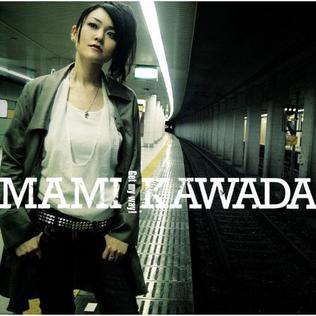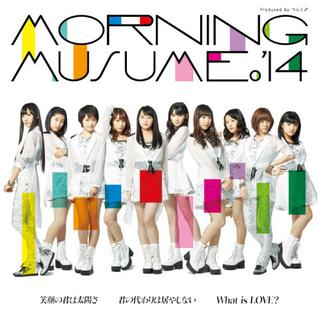Horizon is pop/rock group Remioromen's third full-length album, released on May 17, 2006. The disc contains 12 songs.

Tsuioku+Love Letter is Japanese singer Hitomi Shimatani's fourth studio album. Released on September 1, 2004, it hit No. 7 on the Oricon charts and went on to sell around 107,000 copies.

Heart & Symphony is Japanese pop singer Hitomi Shimatani's fifth studio album. There is both a CD and CD+DVD format. The CD+DVD version is limited, and the first pressing of the CD only version comes with a bonus track.

Sol Bianca: The Legacy is a Japanese OVA miniseries of six episodes loosely based on the OVA series Sol Bianca and employing computer generated animation. This version is a re-imagining of the ship and crew of Sol Bianca, and does not follow the continuity of the original. Sol Bianca: The Legacy combines 3D graphics with 2D animation, particularly in rendering spaceships such as the Sol Bianca itself.

"Daydream Café" is Fayray's 4th single. It was released on May 12, 1999 and peaked at #41. The song was used as the ending theme for the TV program "Ninkimono de Yukou!".

BT is the third compilation album by Buck-Tick, released on March 20, 1999. It compiles every single and B-side they released while signed to Victor Entertainment, except the live B-sides of "Die". It also includes a demo version of "Romanesque". It reached number sixteen on the Oricon chart. The album was remastered and re-released on September 5, 2007.

Kurutta Taiyou is the sixth studio album by the Japanese rock band Buck-Tick. It was released on cassette and CD on February 21, 1991 through Victor Entertainment. The album was digitally remastered and re-released on September 19, 2002, with two bonus tracks. It was remastered and re-released again on September 5, 2007. "Speed", "M・A・D" and "Jupiter" were later re-recorded for the group's compilation album Koroshi no Shirabe: This Is Not Greatest Hits (1992). The album peaked at number two on the Oricon charts and has sold 320,000 copies. It was named number 40 on Bounce's 2009 list of 54 Standard Japanese Rock Albums.

"Get my way!" is the fourth single from J-pop singer Mami Kawada under Geneon Entertainment. The title track was used as the second outro theme for the anime series Hayate no Gotoku. The single reached #27 on the Oricon charts selling roughly 7,253 copies making this as Kawada's least successful single to date.

"Buzz!!" The Movie is the third live VHS released by Japanese rock duo B'z. It was later released on DVD, on March 14, 2001.

Set List: Greatest Songs 2006–2007 is a greatest hits album by AKB48, released on January 1, 2008. It was re-released on July 14, 2010 as Set List: Greatest Songs Kanzenban with four new tracks: the singles "Romance, Irane" and Sakura no Hanabiratachi 2008", along with brand new songs "Seventeen" and "Anata ga Ite Kureta Kara".

Nishoku no Koma (二色の独楽) is the fourth studio album by Japanese singer-songwriter Yosui Inoue, released in October 1974.

Boku no Taiyō' is Japanese idol group AKB48's seventh single, and the fifth major single released through DefSTAR Records, on August 8, 2007.

Egao no Kimi wa Taiyou sa / Kimi no Kawari wa Iyashinai / What is LOVE? is Morning Musume's 55th single, and the first to be released under the name of Morning Musume '14. It was released on January 29, 2014 in 6 editions: 2 regular and 4 limited editions.

Dreamin' Sun is a Japanese slice of life romance shōjo manga series written and illustrated by Ichigo Takano. It was serialized in Shueisha's Bessatsu Margaret manga magazine. It was compiled into 10 volumes published between 2008 and 2011. The manga is published in English by Seven Seas Entertainment.

"Taiyō Nokku" is the 12th single by Japanese idol girl group Nogizaka46. It was released on July 22, 2015. It was number-one on the weekly Oricon Singles Chart, reaching a new record for first week sales by the group, with 609,202 copies. It was the best-selling single in Japan in July, with 629,996 copies. As of November 23, 2015 it had sold 678,481 copies. It was also number-one on the Billboard Japan Hot 100. The Japanese television drama series Hatsumori Bemars uses the title song as the theme song.

Lead! Heat! Beat! is the third studio album by Japanese hip-hop group Lead. The album ranked No. 15 on Oricon and remained on the charts for four weeks. The album was released on August 10, 2005, nearly a year since their previous album, Brand New Era, and held three preluding singles: Tenohira wo Taiyou ni/Delighted, Atarashii Kisetsu e and Baby Runnin' Wild.
Taiyou no Toriko is the first EP/studio album by Japanese rock band Fanatic Crisis. It was released by the independent label Noir on April 28, 1995. The first version features six tracks. The second version features three additional tracks.

Tenohira wo Taiyou ni / Delighted(手のひらを太陽に / Palm to the Sun) is the seventh domestic single by Japanese hip hop group Lead. The single charted in the top ten on the Oricon charts, coming in at #8, and remained on the charts for four weeks.
Qyoto is a Japanese pop band under the Ariola Japan label. The band name comes from spelling Kyoto. Their main producer is Daiko Nagato from recording company Being Inc.
The Sun Never Sets is a 2000 Japanese television series. Starring Hideaki Takizawa, Yasuko Matsuyuki and Yūka, it aired from 13 April to 22 June 2000 on Fuji TV.















